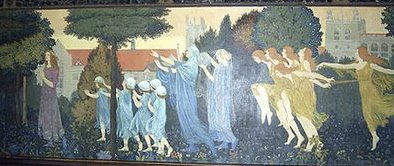Dangerous Songs
First, go here to read about how one Quaker is making herself dangerous.
Her piece reminded me of Pete Seeger's album, Dangerous Songs!? and a comment I left on a page several years ago about how dangerous singing can be.
I first heard of Pete Seeger through a right-wing Lutheran publication that complained that he had been invited to sing at a Walther League convention (the youth organization of the Lutheran Church-Missouri Synod) in 1964 or so. I remember asking why everyone was so upset about a "former communist" singing to the Walther Leaguers. "How could singing songs hurt anybody's faith?" I asked. The insipid answer was that we should have found a good Lutheran folk-singer.One of my small contributions to the undermining of the Empire is to sing these songs and teach them to others, to keep them alive.
Years later -- April 22, 1971 to be precise -- I heard Pete sing "Last Train to Nuremberg" at the big pre-May Day rally in Washington, D.C. I was electrified, and began to realize how naive my question had been: Music CAN be dangerous, especially to those whose position and influence rests on violence, coercion, lies, and fear. The right wingers were exactly right to be afraid of Pete's influence on young people. Hearing him sing Malvina Reynold's "Little Boxes" and "God Bless the Grass" was like a hyper-link to the idea that the world could be a better place if only we took responsibility for making it so.
Another one of my favorites on that album is this one. The song is an old one, dating back at least 200 years and perhaps to the Peasant Wars in the 1520s. It always makes me think of my older Quaker Friends, especially one who I could always count on hearing call into public radio talk programs or to write just the right letter to the editor.
Die Gedanken sind frei!I'm also reminded of a story about another dangerous song. My friend works for a state agency that grants clean air and water permits for construction projects. She once was feeling a lot of pressure to grant a permit for a new project even though the application wasn't quite right and didn't meet the appropriate standards. Even though the pressure was intense, she stood firm.
My thoughts freely flower.
Die Gedanken sind frei!
My thoughts give me power.
No scholar can map them,
No hunter can trap them,
No man can deny,
Die Gedanken sind frei!
I think as I please
And this gives me pleasure,
My conscience decrees,
This right I must treasure;
My thoughts will not cater
To duke or dictator,
No man can deny--
Die Gedanken sind frei!
And if tyrants take me
And throw me in prison
My thoughts will burst free,
Like blossoms in season.
Foundations will crumble,
The structure will tumble,
And free men will cry:
Die Gedanken sind frei!
She says that singing this song from the Sacred Harp gave her the strength to persevere. The song is entitled "Confidence."
Away, my unbelieving fear;One more story. In 1979 or so, the state of Indiana was preparing to execute a man convicted of murdering a mother and her children, Steven Judy. I joined a hundred or so of others in the parking lot of the state prison in Michigan City in the late afternoon and evening for a prayer vigil to protest the execution. It was a solemn assembly, mostly silent, no speeches, just a presence.
Fear shall in me no more have place;
My Savior doth not yet appear;
He hides the brightness of His face;
But shall I therefore let Him go,
And basely to the tempter yield?
No, in the strength of Jesus, no!
I never will give up my shield.
In the parking lot were a half-dozen TV trucks with their cameras, satellite dishes and bright lights, filming us for the 10 o'clock news. Not that we made for very good visuals -- all we were doing was kneeling and praying silently -- but it was something. (I remember meeting a college classmate who was then reporting as a stringer for National Public Radio's Chicago bureau that night. She actually talked to people instead of just filming them, and she ended up with a lot more material for her radio report than the TV folks did for theirs.)
All of a sudden, we heard a commotion near the fence, the sound of loud voices. Almost immediately, the cameras and the lights swung away from us and towards the fence where a little knot of five or six white men in brown uniforms and some Nazi-like insignia were holding up a bedsheet with the words "Fry Him" spray painted on it. They were chanting something, and one of them was trying to make a speech of some sort.
We were all of a sudden left in the dark, illuminated only by our candles. The tone of the voices of the guys by the fence was distrubingly ugly, but we stayed put, kneeling, and praying. After a minute or two, someone started singing "We Shall Overcome" very softly. Her voice was joined by the others and by the middle of the first verse we were all singing.
Then, just as suddenly, the lights and the microphones swept our way again leaving the Nazis looking almost naked and alone and even more stupid standing in the dark again by the fence. Then the guy who was giving the speech started screaming, "They're singing that song again! I hate that song! Whenever we do anything they sing this goddamn song!"
He was right, you know. Singing "We Shall Overcome" in a parking lot of a prison is dangerous.




